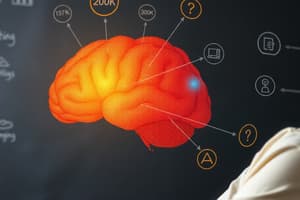Podcast
Questions and Answers
What term describes the ability to produce new and valuable ideas?
What term describes the ability to produce new and valuable ideas?
- Convergent thinking
- Creativity (correct)
- Divergent thinking
- Algorithm
When a toddler refers to all four-legged animals as dogs, which cognitive process is being illustrated?
When a toddler refers to all four-legged animals as dogs, which cognitive process is being illustrated?
- Metacognition
- Assimilation (correct)
- Accommodation
- Functional fixedness
Which of the following describes a mental image or best example of a category?
Which of the following describes a mental image or best example of a category?
- Schema
- Concept
- Prototype (correct)
- Heuristic
What does functional fixedness refer to in problem-solving?
What does functional fixedness refer to in problem-solving?
Which cognitive bias is the tendency to seek out information that supports one's existing beliefs?
Which cognitive bias is the tendency to seek out information that supports one's existing beliefs?
What type of thinking narrows down available problem solutions to find the single best solution?
What type of thinking narrows down available problem solutions to find the single best solution?
Which process involves a sudden realization of a problem's solution?
Which process involves a sudden realization of a problem's solution?
What is the function of an algorithm in problem-solving?
What is the function of an algorithm in problem-solving?
What term describes the tendency to overestimate future leisure time or income?
What term describes the tendency to overestimate future leisure time or income?
Which type of memory involves recalling information without any provided cues?
Which type of memory involves recalling information without any provided cues?
What phenomenon is defined as the initial belief in one's conceptions despite contrary evidence?
What phenomenon is defined as the initial belief in one's conceptions despite contrary evidence?
Which type of memory is primarily formed by classical conditioning?
Which type of memory is primarily formed by classical conditioning?
What is the capacity of short-term memory, as commonly referenced?
What is the capacity of short-term memory, as commonly referenced?
Which type of processing is typically used for information that we automatically encode?
Which type of processing is typically used for information that we automatically encode?
What effect describes the phenomenon of studying being more effective when spaced out over time rather than crammed?
What effect describes the phenomenon of studying being more effective when spaced out over time rather than crammed?
What term refers to the memory phenomenon where prior learning interferes with the recall of new information?
What term refers to the memory phenomenon where prior learning interferes with the recall of new information?
In the context of memory retrieval, what does context-dependent memory refer to?
In the context of memory retrieval, what does context-dependent memory refer to?
What is the process of converting short-term memories into long-term memories called?
What is the process of converting short-term memories into long-term memories called?
Which brain structure is primarily involved in the formation of explicit memories?
Which brain structure is primarily involved in the formation of explicit memories?
What is the effect called where misleading information alters a person’s memory of an event?
What is the effect called where misleading information alters a person’s memory of an event?
Which phenomenon explains the tendency to remember items at the beginning and end of a list more effectively?
Which phenomenon explains the tendency to remember items at the beginning and end of a list more effectively?
What type of rehearsal involves connecting new information to existing knowledge?
What type of rehearsal involves connecting new information to existing knowledge?
Flashcards
Concept
Concept
A mental group of similar ideas or objects with shared characteristics, a general idea.
Prototype
Prototype
The best example of a concept or category.
Schema
Schema
A mental framework for organizing and interpreting information about the world.
Assimilation
Assimilation
Signup and view all the flashcards
Accommodation
Accommodation
Signup and view all the flashcards
Algorithm
Algorithm
Signup and view all the flashcards
Heuristic
Heuristic
Signup and view all the flashcards
Confirmation Bias
Confirmation Bias
Signup and view all the flashcards
Overconfidence
Overconfidence
Signup and view all the flashcards
Planning Fallacy
Planning Fallacy
Signup and view all the flashcards
Belief Perseverance
Belief Perseverance
Signup and view all the flashcards
Framing
Framing
Signup and view all the flashcards
Nudge
Nudge
Signup and view all the flashcards
Gambler's Fallacy
Gambler's Fallacy
Signup and view all the flashcards
Sunk Cost Fallacy
Sunk Cost Fallacy
Signup and view all the flashcards
Recall
Recall
Signup and view all the flashcards
Recognition
Recognition
Signup and view all the flashcards
Relearning
Relearning
Signup and view all the flashcards
Long-Term Potentiation
Long-Term Potentiation
Signup and view all the flashcards
Synaptic Plasticity
Synaptic Plasticity
Signup and view all the flashcards
Encode (Info Processing Model)
Encode (Info Processing Model)
Signup and view all the flashcards
Store (Info Processing Model)
Store (Info Processing Model)
Signup and view all the flashcards
Retrieve (Info Processing Model)
Retrieve (Info Processing Model)
Signup and view all the flashcards
Study Notes
Cognitive Processes
- Cognition: Mental activities like thinking, knowing, remembering, and communicating
- Metacognition: Tracking one's own mental processes
- Concepts: Mental groupings of similar objects or ideas (e.g., "chair" – something to sit on, furniture)
- Prototype: Mental image of a typical example of a category (e.g., a robin is a better prototype of "bird" than an ostrich)
- Schemas: Mental molds into which we pour our experiences; help us organize and interpret info
- Assimilation: Interpreting new experiences using existing schemas (e.g., child calling all four-legged animals "dog")
- Accommodation: Adapting existing schemas to incorporate new info (e.g., child learning that a pig is a different animal, though four-legged)
- Creativity: Generating new and valuable ideas
- Convergent Thinking: Finding one best solution to a problem (e.g., standardized tests)
- Divergent Thinking: Exploring many possible solutions to a problem (e.g., creative problem solving)
- Functional Fixedness: Inability to see a problem from a different perspective; hindering problem-solving (e.g., assuming a hammer is only for hammering)
- Executive Functions: Cognitive skills that combine to manage our thoughts (e.g., planning, problem-solving)
Memory
- Memory: Learning that persists over time
- Algorithms: Step-by-step procedures guaranteeing a solution (e.g. recipes)
- Heuristics: Mental shortcuts or simplified strategies (e.g. judging a person's character by their clothing)
- Insight: Sudden solutions to problems
- Confirmation Bias: Seeking only supporting evidence for existing beliefs
- Fixation(Mental Set): Approaching problems in one specific way, impeding flexibility
- Perceptual Set: Mental bias to perceive one thing instead of another
Cognitive Biases
- Intuition: Automatic feelings or thoughts
- Representative Heuristic: Judging likelihood based on how well something matches a prototype (can lead to misconceptions)
- Availability Heuristic: Judging probability based on how easily instances come to mind
- Overconfidence: Overestimating one's accuracy
- Planning Fallacy: Overestimating leisure time or income in plans
- Belief Perseverance: Sticking to initial beliefs even when incorrect
- Framing: How an issue is presented, influencing choices and decisions
- Nudge: Influencing decisions subtly but beneficially
- Gambler's Fallacy: False belief that a random event's probability changes after preceding events
- Sunk Cost Fallacy: Continuing something despite having invested substantial time or resources in it
- Information Processing Model: Encoding, storing, retrieving information
Memory Models
- Sensory Memory: Brief storage of sensory input (iconic - visual, echoic - auditory)
- Short-Term Memory: Temporary storage, limited capacity (7 +/- 2 items)
- Working Memory: Active processing of information (links new to existing, limited)
- Long-Term Memory: Permanent storage, potentially limitless capacity (explicit and implicit memories)
- Effortful Processing: Encoding with attention and conscious effort (e.g., studying)
- Automatic Processing: Encoding without conscious effort (e.g., procedural memories, spatial/temporal/frequency info)
- Maintenance Rehearsal: Repeating information to keep it in short-term memory (not long-term)
- Elaborative Rehearsal: Connecting new information to existing knowledge for better retention (more effective)
Long-Term Memory
- Explicit Memories: Consciously recalled memories (semantic & episodic)
- Implicit Memories: Unconsciously recalled memories (procedural, spatial, frequency)
- Parallel Processing: Processing multiple aspects simultaneously
- Sequential Processing: Processing one aspect at a time
Encoding Strategies
- Shallow Processing: Encoding based on physical or sound attributes
- Deep Processing: Encoding based on meaning/understanding
- Chunking: Grouping information into manageable units
- Method of Loci: Visualizing information in a familiar location
- Spacing Effect: Spacing study sessions for better retention
- Testing Effect: Enhanced recall after retrieval practice
Memory Processes and Factors
- Memory Consolidation: Process of converting short-term to long-term memories
- Infantile Amnesia: Inability to consciously recall memories from early childhood (before age 4)
- Long-Term Potentiation: Strengthening of neural connections, contributing to memory
- Synaptic Plasticity: Ability of synapses to change over time (affect memory storage)
- Hippocampus: Crucial for forming new memories (does not store permanently)
- Cerebellum: Storage of implicit memories (e.g., procedural motor skills, certain classical conditioning)
- Basal Ganglia: Involved in procedural memory and motor control
- Amygdala: Processes emotional memories (stress hormones play a role)
- Flashbulb Memories: Vivid memories of emotionally significant events
- Retrospective Memory: Retrieving past memories; Prospective Memory: Remembering future intentions
Memory Disorders, Interference, and Errors
- Alzheimer's Disease: Neurological disorder causing progressive memory decline
- Amnesia (Retrograde/Anterograde): Loss of memory
- Misinformation Effect: Memory distorted by misleading information
- Imagination Inflation: Memory distorted by mentally rehearsing events
- Source Amnesia: Forgetting the origin of a memory
- Proactive/Retroactive Interference: Prior/new learning interfering with recall
- Serial Position Effect (Primacy/Recency): Tendency to remember first and last items best
- Interleaving: Mixing study topics for better learning
- Ebbinghaus' Forgetting Curve: Forgetting is rapid at first, then slows down over time
Memory Retrieval Issues
- Context-Dependent Memory: Recall is easier in the same environment as storage
- State-Dependent Memory: Recall is easier when in the same emotional or physiological state as storage
- Context-Dependent Memory: Recall is easier in the same environment as learning
- Priming: Exposure to one stimulus influences response to a related stimulus
Studying That Suits You
Use AI to generate personalized quizzes and flashcards to suit your learning preferences.




